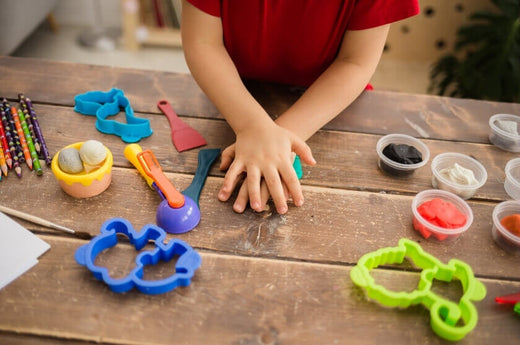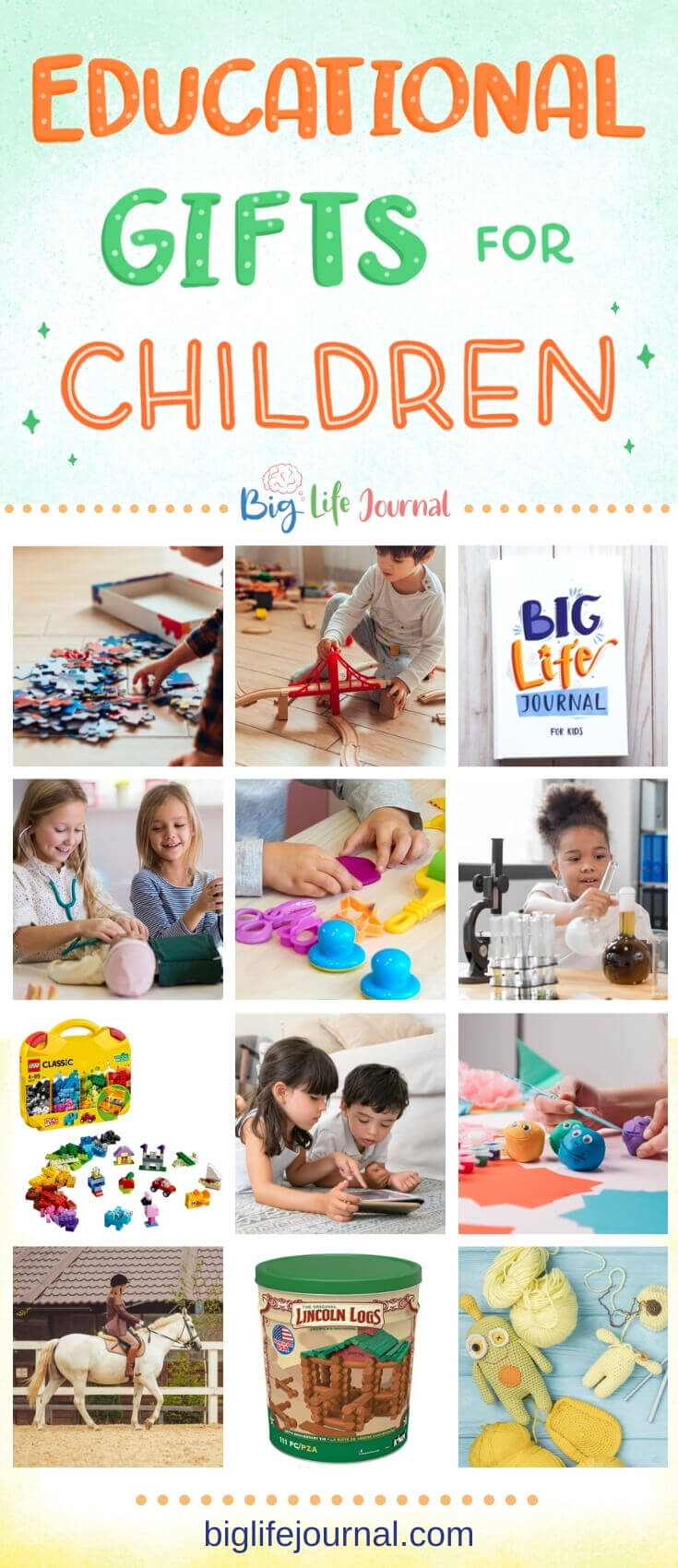
Educational Gifts for Children
Gift buying for that unique child in your life can be tricky. Of course, you want something they will enjoy, but there is also pressure for educational gifts for kids that are meaningful and nurture their growing minds. Gift-giving should embrace a child's interest while also considering their age development. Here are some good gift ideas for that unique child in your life.
We recommend journaling together as a bonding experience. Our journals and cards are designed to help people of all ages develop positive mindsets and essential life skills. By encouraging self-love, gratitude, and kindness, our products can help foster confidence and resilience and ensure that young minds grow into happy and confident adults. Go here to shop our holiday bundles.
Before you continue, we thought you might like to download our FREE Personal & Family Values. This printable provides a great opportunity for your family to explore and identify values that can help guide you and your children in making the right choices.

Think About Age and Stage of Growth
Depending on your child's age, select a gift appropriate for their development stage. This might differ from the recommended age, which is perfectly fine. Here are some gift ideas that can be utilized in a variety of ways.
Crayons and art supplies: From toddler to adulthood, crayons are something children of all ages enjoy. Choose thicker, chunkier crayons, markers, and pencils for little fingers. Items can become more slender as children's fine motor skills are honed. Don't throw away those old crayons - broken crayons are a great way to give fine motor skills a good workout.
Playdough, clay, and slime: Once a staple in preschool classes, this medium expands with children's creativity. Now used as a sensory integration item, playdough, and slime help children, young and older, work through frustrations, such as anger, while fostering their creativity. Fine motor skills also get an excellent workout.
Expression and emotional development: Think about ways to foster communication and self-expression like journal writing. For toddlers and preschoolers, pads of drawing paper are good ways for children to draw about their day. At around six years of age, journals with prompts for an older child to help foster emotional regulation.
Looking for a useful and fun way to introduce your child to journaling? The Big Life Journal - Daily Edition (ages 5-11) is a science-based journal that helps children grow resilient, confident, and emotionally healthy. The daily activities inside the journal help your child focus on encouraging, self-loving thoughts and wire their brain for growth mindset, resilience, confidence, gratitude, kindness, and self-love.
Consider the Longevity of the Toy
Caregivers are likely to enjoy toys that last while children will appreciate toys that can withstand rough play. Fun educational gifts for children are best when they stand the test of time.
LEGO bricks: These plastic blocks come in various sizes, dependent on the audience. Duplo blocks are an excellent starter for little ones, while Lego blocks progress in difficulty as children age.
Tinkertoys: These classic blocks are an excellent choice for fostering creativity. Children can also search online for directions to make famous sites of interest and buildings.
Lincoln Logs: These classic blocks are great for building first home creations but adapt and grow with your child's imagination. A starter kit will help preschoolers with fine motor skills, while older children will find fun using the logs alongside other toys. In addition, Lincoln Logs can build the perfect home for action figures and even dolls.

Choose Toys that Grow and Adapt with Your Child
As children age, their needs and desires change. One option is toys that remain interesting for the long haul. Toys should not only be able to hold your child’s interest, but also remain adaptable for your child’s needs.
Experience Gifts: These gifts provide a live experience for children and families. Whether taking a ceramics class or going horseback riding, these gifts are flexible and can adapt to the ages and needs of your little one.
Building materials: Toys like blocks are highly adaptable and toys such as LEGO bricks can provide your child with hours of joy from preschool through adulthood.
Crafting toys: Providing children with a new hobby or craft gives your child opportunities to expand their abilities and fosters a love of learning. Crocheting and knitting, sewing, carpentry, and painting are just a few crafting ideas to ignite your child's next passion. For example, a child who begins painting in grade school may find themself winning art contests in high school, perhaps acquiring an art scholarship later.
Technology is a Consideration for Many Families
There are several technologically-minded toys to choose from, so be aware of how you feel about your child using technology. Screen time is a consideration many caregivers forget.
If your child has a 30-minute screen time limit and you give them a game that requires more time to master, you may end up with lots of frustration and tears. Tech-minded gifts stimulate your child’s brain while also nurturing cause-and-effect thinking. The games can aid hand-eye coordination and motor skill-building. However, it is best to be mindful of screen time and make sure to set time limits appropriate for your child’s age.
Keep screen time to a minimum toward bedtime as blue screens can hinder the natural circadian rhythm.
Computers: Computers have become a less expensive choice for many families, with units like the Chromebook meeting even the most fiscal budgets. Computers do require parents to maintain a connection with children and computers to ensure safety and protection.
Tablets: Like computers, tablets also require safety and protective features. They do provide intriguing apps and programs that allow children to research and engage with unique opportunities. Science-focused children can enjoy partaking in chemical experiments without danger or conducting dissections without actually harming animals.
Computer Games: While children can become addicted to games and spend hours mindlessly playing, parents can provide guidelines and rules to ensure appropriate play. Games like Minecraft allow children to foster creativity and imagination (think video-version Lego bricks). Computer games also allow children to interact and play with others in person and online. Social groups allow children with similar interests in games to meet up in person and online, to share what they are building, as well as tricks and tips for the game.
Don't forget to download our FREE Personal & Family Values. These colorful and easy-to-use cards will help guide you and your family in making the right choices.
Keep Your Child's Attention Span in Mind
Making sure your child is learning is essential, but you also want to be certain children are drawn to the toy and use it. Be sure you find items that are both educational and fun. Choose toys that embrace your child's interests but also promote critical thinking and problem-solving.
Problem-solving: Toys requiring problem-solving, like puzzles, are a fantastic way to maintain attention. From hand puzzles and jigsaws to brain teasers, these clever games provide hours of learning and entertainment.
Embrace hobbies and interests: Books are usually a safe gift, but make it memorable by honing their interests. A stack of dinosaur-focused material will become a gift that keeps giving for the little paleontologist in your life.
Bet on science: Science kits are another option to maintain a child's interest. Items to support science experiments and learning the scientific method are a great choice. Think about telescopes, microscopes, or chemistry sets. Be sure to keep age appropriateness in mind.
Gifts Can Serve Multiple Purposes
It's wonderful when a toy serves multiple purposes. From a financial standpoint and for maintaining children’s interests. Gifts that serve multiple roles usually remain high on the lists of toys which serve as your child’s faves.
Dolls and action figures: These items serve multiple purposes. They can teach colors, body parts and foster socialization. They also help children act out their feelings and talk about things that might be difficult to express otherwise.
Magnetic play pieces: These can be made up of stories, places, or professions. They can also include words and names for older children wanting to piece together sentences.
Planes, trains, and automobiles: Like dolls, these gifts will provide a means for safely acting out feelings as well as your child's own stories. They can help children work through fears. For example, a child afraid of flying can become better acquainted with a toy plane to lessen the anxiety.
Think About Your Child's Needs
A child's success often hangs on their environment and the support they receive for their individual needs. The best educational gifts for kids consider their needs. Children with sensory considerations may require more thoughtful ideas when looking at how that child interacts best with their environment. For example, children may be sensitive to loud noises or flashing lights. Other children may benefit from that type of toy.
Gift buying becomes easier when you know your child's interests and abilities and you find items that complement their uniqueness. Even thinking back to your childhood can help you consider gifts you enjoyed and ones that kept your interest. For example, to choose cool educational gifts for kids, think if you had a toy you hated to part with, then consider something similar for your child.
If you’re looking for games that make great gifts, we’ve curated a list of 13 educational games for kids here!

